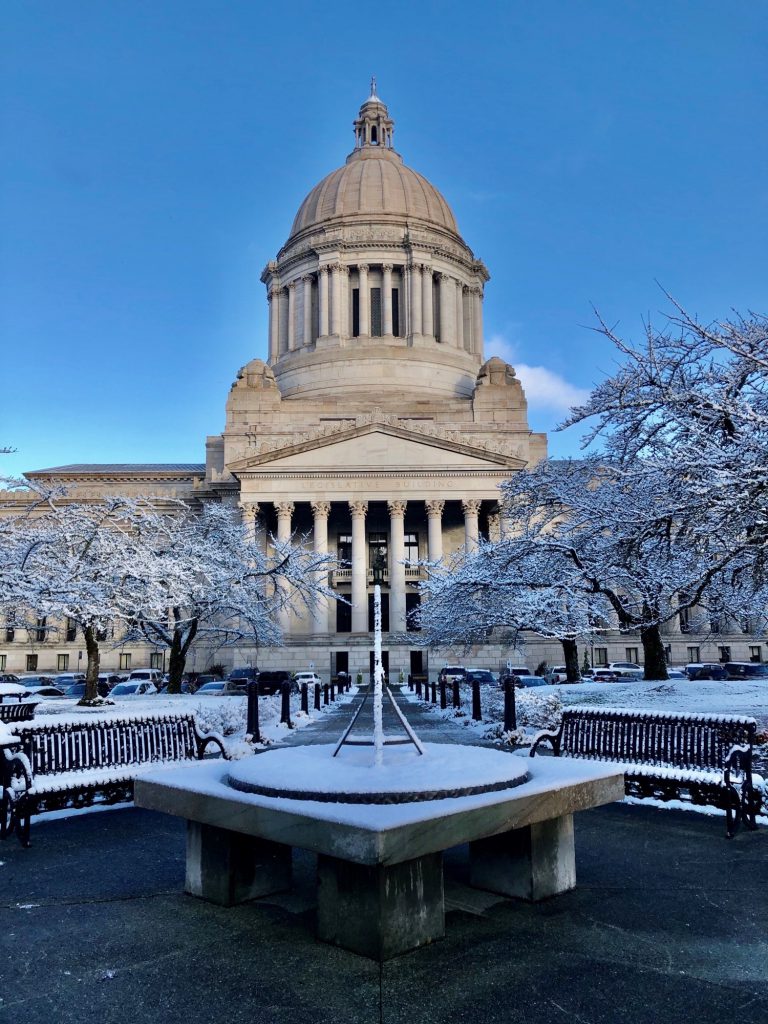NFIB quickly goes on record in 11 of the more than 100 bills it is tracking
State Director Patrick Connor reports from Olympia on the small-business agenda for the political and legislative week ending January 12.
The second half of the 68th Washington State Legislature convened Monday, January 8. This year’s short, 60-day session is scheduled to end March 7. This tight timeline puts added pressure on lawmakers to move bills quickly in advance of looming deadlines or “cut-off” dates.
Small Business Day
Save the date! NFIB will hold its annual Small Business Day at the Capital on Tuesday, February 20, at the DoubleTree by Hilton. The hotel is located at 415 Capitol Way North, Olympia, Washington, 98501, near the Farmers Market. Stay tuned for details.
The Legislature
NFIB is already tracking more than 100 bills that could impact small businesses if enacted. This week, NFIB went on record for 11 bills that received a public hearing.
HB 1893, SB 5777, Expediting unemployment benefits for striking or locked-out workers
NFIB signed in opposed to both bills, which were heard in House and Senate labor committees, respectively. This issue is on our state member ballot. Early results are showing more than 90% of NFIB members oppose extending these benefits. Nonetheless, the Senate Labor Committee is scheduled to approve the bill on Tuesday, January 16. The House Labor Committee plans to approve its version on Friday, January 19.
HB 1898, Relief of unemployment insurance benefit charges
This Employment Security Department proposal would create an automatic process to relieve employers of experience-rated charges in certain situations where workers were ineligible for those benefits. The bill has bipartisan support and has already been heard and approved by the House Labor Committee. NFIB supports this bill reducing paperwork and red tape for employers.
HB 1901, Unemployment voluntary program extension
This agency request bill will allow employers choosing to do so to contribute to the unemployment trust fund an amount equal to benefits paid to that employer’s discharged workers. NFIB supports the bill.
HB 1927, Shortening the waiting period to receive workers’ compensation temporary total disability payments
NFIB opposes the bill because it would jeopardize the ability of both employers and the Department of Labor & Industries (L&I) to adequately investigate and confirm this type of injury has been sustained and is compensable under state law. Premature payment of benefits could lead to overpayments, which the department has a poor history of recovering. This is likely to add unnecessary and uncollectible costs to the system.
HB 1933, Right to repair
NFIB testified in favor of this year’s bill, which added agricultural equipment and motorized wheelchairs to the list of covered products. More than 400 people signed up supporting the bill, far outshining the handful of those testifying or signing-in opposed.
HB 1940, SB 5778, Restricting employers’ ability to communicate with workers
Billed as worker rights legislation, these companion bills are effectively a gag-order on employers wishing to communicate with workers regarding unionization, harmful legislation and regulations, political candidates, or “religious matters.” NFIB opposes the bill.
HB 2031, PTSD occupational disease presumption for coroners and medical examiners / investigators
The bill would waive the existing prohibition on PTSD claims in the workers’ compensation system to allow current and retired coroners, medical examiners, investigators, and support staff in these county offices to apply for benefits, including lifetime pensions.
As NFIB warned years ago, this has become a routine occurrence in the Legislature. It started with first responders, was extended to E911 operators, then to nurses, and now likely to county officials elected or appointed to these positions along with the staff in their offices.
L&I estimates these claims cost an average of $650,000 each. If just 10% of this group were to file claims, the cost to the State Fund would be nearly $9 million. We find this bill particularly egregious given that 32 county coroners are elected. They didn’t just accept any job to feed their families. They filed for office, raised money from friends, family, and other supporters, then went door-to-door asking voters to entrust them with the office. Medical examiners and forensic investigators pursued advanced degrees and training for these jobs. These are not unsophisticated workers in need of special protection. They are politicians and highly trained medical professionals who knew exactly what the job entailed before they pursued it.
Surprisingly, NFIB was the only organization to oppose this bill during Friday’s public hearing.
HB 2072, Concerning penalties relating to antitrust actions
The Attorney General’s Office requested this bill to increase penalties for antitrust activities, removing the current $150,000 cap. Given the harm caused to small businesses and other consumers by those committing antitrust violations, NFIB signed in supporting the bill.
SB 5924, Access to personnel records
Sen. Patty Kuderer is back again with a slightly revised bill allowing aggrieved workers to sue employers for failure to provide personnel records in a complete and timely manner. This version would allow employers 21 days to comply with a worker’s (or their attorney’s) request for records. The bill still prohibits redacting personally identifiable information about third-parties who may have complained about the worker. The bill still provides litigation as the only recourse for aggrieved workers. Those lacking the resources to sue their employer are left without any low- or no-cost administrative remedy, just as employers are prevented from seeking an administrative resolution to questionable or even blatantly false claims. NFIB opposes the bill.
State Business Licensing Service
NFIB has been working with the state Department of Revenue on a proposal to give businesses closed by government order due to a public health incident, natural disaster, or other declared emergencies additional time to renew annual business licenses without incurring higher fees or penalties.
The department is redrafting our proposed language. Rep. Larry Springer has agreed to be the bill’s prime sponsor.
NFIB thanks our bill sponsor and the great team at DOR for all the assistance and hard work they put into this endeavor.

